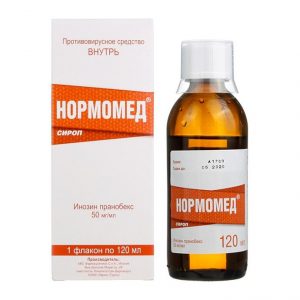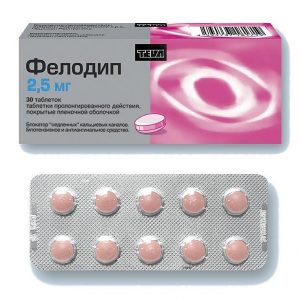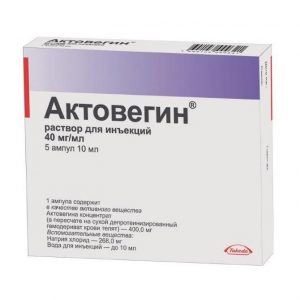Description
Pharmacological action
The drug prostaglandin E1 (PgE1) improves microcirculation and peripheral circulation, has a vasoprotective effect. With systemic administration, it causes relaxation of smooth muscle fibers, has a vasodilating effect, reduces total peripheral vascular resistance (OPSS), without changing blood pressure (BP). In this case, a reflex increase in cardiac output and heart rate (HR) is noted. It improves the rheological properties of blood, helping to increase the elasticity of red blood cells and reducing platelet aggregation and neutrophil activity, and increases the fibrinolytic activity of blood.
It has a stimulating effect on the smooth muscles of the intestines, bladder, uterus inhibits the secretion of gastric juice.
Indications
Chronic obliterating arterial disease of the III-IV stage (according to Fontaine’s classification) in patients who cannot be revascularized or after unsuccessful revascularization.
Intravenous use in the treatment of chronic obliterating diseases of stage IV arteries is not recommended.
Contraindications
– Hypersensitivity to alprostadil or other components of the
drug – chronic heart failure III-IV functional class according to NYHA
– hemodynamically significant cardiac arrhythmias
– exacerbation of the course of six months old myocardial infarction – mitral and / or aortic stenosis and / or
failure – acute pulmonary edema or a history of pulmonary edema in patients with heart disease
– severe stump chronic obstructive pulmonary disease, or pulmonary disease venookklyuzionnoe
– infiltrative lung disease
– diseases accompanied by an increased risk of bleeding (peptic ulcer and / or duodenal ulcer)
– concomitant therapy with vasodilator or anticoagulant drugs
– cerebrovascular accident during the last six months
– severe arterial hypotension srdlkrd ol – dysfunction liver failure (increased activity of aspartate aminotransferase, alanine aminotransferase or gamma glutamyl transferase) or severe hepatic edostatochnost, including
history – general contraindications for infusion therapy (eg, chronic heart failure, edema and hyperhydration of the lungs or brain)
– pregnancy and the period of breastfeeding
– age up to 18 years (efficacy and safety have not been established).
With caution:
– Arterial hypotension
– chronic heart failure of the I-II functional class according to NYHA (special attention should be paid to controlling the load of the volume of the carrier solution)
– patients undergoing hemodialysis (treatment with the drug should be performed in the post-dialysis period)
– patients with type 1 diabetes mellitus, especially with extensive vascular lesions (in elderly patients).
Special instructions
Arteris-Vero ® must not be administered bolus!
The drug Arteris-Vero ® can only be used by doctors who have experience in angiology, are familiar with modern methods of continuous monitoring of the cardiovascular system.
Patients with coronary heart disease, as well as patients with peripheral edema and impaired renal function (serum creatinine over 1.5 mg / dl) should be monitored in a hospital for one day after discontinuation of the drug.
For patients with renal failure or patients who may be at risk for impaired cardiac function, the volume of fluid administered during infusion should be limited to 50-100 ml per day to avoid the appearance of symptoms of hyperhydration.
During the treatment period, regular monitoring of blood pressure, heart rate, biochemical parameters of blood, blood coagulation system is required (in case of disorders of the blood coagulation system or with simultaneous therapy with drugs that affect the parameters of the coagulation system), if necessary, control of body weight, fluid balance , measurement of central venous pressure, conducting an echocardiographic study.
Phlebitis (proximal to the injection site), as a rule, is not a reason for stopping therapy, signs of inflammation disappear within a few hours after the end of the infusion or change in the injection site, specific treatment is not required in such cases. Catheterization of the central vein reduces the incidence of this side effect.
When a vial is damaged, the lyophilisate becomes wet and sticky and greatly decreases in volume. In this case, the drug can not be used.
Impact on the ability to drive transp. Wed and fur .:
Alprostadil may cause a decrease in systolic blood pressure and, therefore, reduces the ability to drive vehicles and engage in other potentially dangerous activities that require increased concentration and speed of psychomotor reactions.
Composition
1 bottle contains:
Active ingredient: alprostadil 60 mcg.
Excipients: Alphadex 1940, 0 mcg of lactose monohydrate, in terms of anhydrous lactose 47.5 mg.
The mass of the contents of the bottle is 49.5 mg.
Dosage and administration
Enter only intravenously or intraarterially.
Intravenous use in the treatment of chronic obliterating diseases of stage IV arteries is not recommended.
It is necessary to prepare a solution immediately before the infusion, under aseptic conditions. Add 4 ml of 0.9% sodium chloride solution for injection into the vial with lyophilizate, and then inject the resulting volume into the vial with 0.9% sodium chloride solution for injection (taking into account the required amount, 50-250 ml).
Lyophilisate dissolves immediately after addition of an isotonic 0.9% sodium chloride solution for injection. Immediately after dissolution, the color of the solution may be milky. This effect is created by air bubbles. After a short time, the solution becomes transparent. Ready solution is recommended to be used immediately after preparation. Stability studies have shown that the prepared solution of the Arteris-Vero ® preparation can be stored at a temperature of no more than 25 C for up to 12 hours.
Pediatric use
Alprostadil is not recommended for use in children and adolescents under the age of 18, since its safety and effectiveness in these age groups have not been studied. Intraarterial administration Stage III and IV
Dissolve the contents of one vial (60 μg alprostadil) in 50 – 250 ml of 0.9% sodium chloride solution for injection. In the absence of other prescriptions, the contents of 1/6 of the vial (corresponding to 10 μg alprostadil) is administered intraarterially for 60-120 minutes when using the device for infusion. If necessary, especially in the presence of necrosis, under strict control of tolerance, the dose can be increased to 1/3 of the bottle (20 μg alprostadil). This dosage is usually used for a single daily infusion.
Intravenous infusion Stage III
Dissolve the contents of one vial (60 μg alprostadil) in 50-250 ml of isotonic 0.9% sodium chloride solution for injection and inject the prepared solution infusion intravenously for 2 hours, 1 time per day.
In patients with impaired renal function (creatinine concentration> 1.5 mg / dL), the intravenous administration of Arteris-vero ® is started with 20 μg alprostadil (1/3 vial), introducing him for two hours. If necessary, after 2-3 days a single dose of 20 mcg can be increased to 40-60 mcg. Patients with renal failure or patients who may be at risk due to impaired cardiac function, the volume of fluid introduced during infusion should be limited to 50-100 ml per day in order to avoid the appearance of symptoms of hyperhydration. Infusion should be carried out using infusion pumps.
The duration of therapy is an average of 14 days, with a positive therapeutic effect, treatment with the drug can be continued for another 7-14 days. The course of treatment should not exceed 4 weeks. In the absence of a positive effect within 2 weeks from the start of treatment, further use of the drug should be discontinued.
The clinical effect may occur with a certain delay at the end of the course of treatment.
Side effects
Possible side effects are listed below on the body systems and frequency of occurrence: very often (> 1/10), often (> 1/100, <1/10), infrequently (> 1/1000, <1/100), rarely (> 1/10000, <1/1000), very rarely (<1/10000), unknown (impossible to estimate by available data). When using alprostadil, the following side effects are possible: Hematopoietic and lymphatic system disorders: Rarely: thrombocytopenia, leukopenia, leukocytosis Very rarely: bleeding, anemia. Disorders of the nervous system: Often: headache Rarely: confusion, seizures of central origin Very rarely: drowsiness, dizziness Unknown: disturbance of cerebral circulation. Disorders from the heart: Infrequently: decreased systolic blood pressure, tachycardia, angina pectoris Rarely: arrhythmia, biventricular heart failure, pulmonary edema Very rare: acute heart failure, ventricular fibrillation, atrioventricular block II degree, supraventricular arrhythmia Unknown: myocardial infarction. Vascular disorders: Very rare: shock. Disorders of the respiratory system, chest and mediastinal organs: Rarely: pulmonary edema Very rare: bradypnea, decreased respiratory function, tachypnea, hypercapnia Unknown: dyspnea. Disorders of the gastrointestinal tract: Infrequently: diarrhea, nausea, vomiting Very rarely: peritoneal symptoms. Metabolic and nutritional disorders: Very rare: hypoglycemia, hyperkalemia. Disorders of the liver and biliary tract: Rarely: increased activity of hepatic transaminases, increased activity of gamma-glutamyltransferase Very rare: hyperbilirubinemia. Disorders of the kidneys and urinary tract: Very rarely: impaired renal function, hematuria. Disorders of the skin and subcutaneous tissue: Often: redness, swelling, flushing. Allergic reactions: Infrequently: skin hypersensitivity, for example, skin rash. Musculoskeletal and connective tissue disorders: Very rare: neck muscle tension, prolonged use (4 weeks or more) may cause reversible tubular bone hyperostosis, and an increase in the titer of C-reactive protein Infrequently: joint pain. General disorders and disorders at the injection site: Often: pain, headache, after intra-arterial administration – a feeling of heat, a feeling of fullness, local edema, paresthesia Infrequently: after intravenous administration – a feeling of heat, a feeling of bursting, local edema, paresthesia, fever, increased sweating, chills Very rarely: anaphylaxis / anaphylactoid reaction, fatigue, hypothermia, general malaise tachyphylaxis Unknown: phlebitis at the injection site, thrombosis, bleeding at the injection site of the catheter. Overdose Symptoms: An overdose of alprostadil may manifest as a marked decrease in blood pressure and reflex tachycardia. Perhaps the development of vasovagal reactions with pallor of the skin, increased sweating, nausea and vomiting. Possible pain, swelling and redness of the skin at the site of infusion. Treatment: With symptoms of an overdose, it is necessary to reduce the dose of the drug or stop the infusion. With a significant decrease in blood pressure, the patient in the supine position needs to raise his legs. If symptoms persist, sympathomimetics should be used. Storage conditions At a temperature not exceeding 25 ° C. Keep out of the reach of children! Expiration 3 years. Do not use after the expiration date printed on the package. Deystvuyuschee substances Alprostadil Conditions of release from drugstores Prescription dosage form injection




